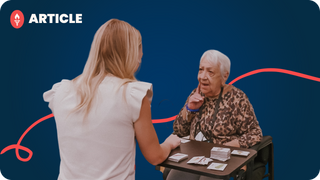I had a student named Abigail a few years back. She was fantastic! The girl knew her stuff, all the foundational knowledge engrained in her—she was smart and savvy. She understood how to work with several different speech and language impairments and knew the cause, assessment techniques, and how to create goals for her patients.
But something wasn’t quite right. Her patients didn’t seem to be able to achieve the same success in the real world as they did in the therapy room. So I asked her if I could observe a session and within the first minute, I knew what to say to her: “Walk away from the workbook!”
Abigail was working with this patient on very appropriate goals. Sequencing, planning, and reasoning skills were all areas that this patient needed assistance with; however, the approach was off and there was one simple reason…she was relying on the good ol’ workbook/worksheets.
You see, there are a plethora of materials available in the speech-language pathology world of treatment, many in the form of workbooks. Hundreds of pages of worksheets with word lists, puzzles, paragraphs, etc. During the session I observed, Abigail was working on something called a garden plot puzzle. There are written details of what someone may plant in a garden and the specific order in which they should plant vegetables. There is a square plot drawn out and the patient is to read the paragraph, use the clues, and write out the vegetables in the appropriate plot. I watched as Abigail’s patient—we’ll call her Mrs. Jones—worked through the puzzle laboriously with intense focus but also, honestly, some definite boredom. I then asked Mrs. Jones if she enjoyed gardening. Her response with a disappointed and discouraged look was, “I grew up in the city…I’ve never seen an actual real garden!”
I looked at Abigail and whispered, “Find out her interest first.”
We spent the next half hour discussing Mrs. Jones’ life. What she did for a living, her family members, her friends, her hobbies, and her interests. Mrs. Jones was known for her cooking. Her meatloaf was “the talk of the town” and with that statement, there was both pride and hesitation. She admitted she had not cooked recently because she kept losing her place and forgetting her steps.
The next day, we all walked away from the workbooks and brought Mrs. Jones to the kitchen. We preplanned a recipe and then Abigail provided information and directions, like what you may find in a workbook but in “real life.” Within minutes, we watched as Mrs. Jones’ eyes lit up and she very carefully planned out, sequenced, and reasoned her way to recreating a master meal.
By walking away from the workbook and providing an activity in real-time that was meaningful, Abigail saw all of what she was working on with Mrs. Jones come to life and carry over to actual scenarios. They then were able to move on to greater planning tasks, with larger/more complex meals and problem-solving opportunities when resources were limited or when other residents entered the room and distracted her. Real-life opportunities that provided instances to use the skills they were working on in therapy, away from workbooks. Simply walking away from a workbook provided her with an opportunity to walk into a world of fun and functional treatment.
This is what we do at Legacy. We help senior adults live a healthy life that is full of purpose, safety, and dignity—and, we make it fun!
Good news for Abigail and Mrs. Jones. Bad news for the publishers of the workbooks. 😉
Interested in learning more about how our wellness programs could impact the lives of seniors in your community? Click the button to connect with our business development team—they’d love to show how this portal can truly make a difference in your community.






